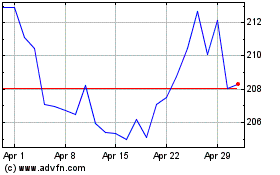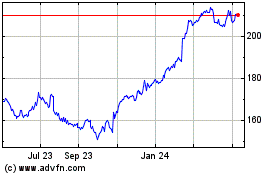Waste Management Wants Consumers to Pay More as It Moves More Trash
May 10 2020 - 9:29AM
Dow Jones News
By Nina Trentmann
Devina Rankin wants to charge cities and towns more to pick up
their trash and recyclables, since Americans working from home are
producing more waste -- and it costs more to get rid of it.
"We need to have conversations about the level of service we are
required to provide because it is different than what we signed up
for," the Waste Management Inc. finance chief said. The weight of
residential waste has increased 15% to 25% since the beginning of
widespread lockdown orders in the U.S., she said.
Meanwhile, Ms. Rankin said volumes in its higher-margin
commercial and industrial business were down 16% in the first
quarter compared with a year earlier.
The Houston-based company has about 18.3 million residential
customers across the U.S. and Canada. The drop in commercial and
industrial trash reduced Waste Management's revenue by about $40
million in the first quarter, hurting its profit margin.
Waste Management and other haulers typically have multiyear
contracts with municipalities for removal of trash and recyclables.
The price paid stays the same, even if there's more waste
produced.
Waste Management's trucks now make more trips to pick up
residential trash and bring it to a landfill or sorting facility.
Disposal costs are rising because of the increased volumes, and Ms.
Rankin said she expects those higher costs to continue even as
businesses and offices reopen.
A 2018 ban by China on waste imports, which sent global prices
for recyclable materials lower, affected some of the company's
margins. The decline in prices for paper, plastic, cardboard and
metal hurt waste-collection companies, which previously recouped a
large chunk of their recycling costs by selling the materials.
However, there is now greater U.S. demand for recycled paper and
cardboard to produce things such as toilet paper and packaging, Ms.
Rankin said. Waste Management is selling 80% to 85% of its recycled
materials domestically, compared with about 70% before the
coronavirus pandemic.
The company has been able to charge higher fees for some
municipalities since the 2018 China ban, and Ms. Rankin said she is
optimistic it will be able to do more of that. "The fundamental
shift in residential waste is well understood and will make the
conversations with municipalities increasingly effective," Ms.
Rankin said.
Waste Management might be successful in asking for price
increases in negotiations with municipalities, assuming more
Americans continue to work from home once the pandemic has ended,
said Noah Kaye, a research analyst at Oppenheimer & Co., an
investment bank.
"The contracts were not set up to reflect a 20% increase in
waste by households. These are extra costs for waste haulers," Mr.
Kaye said.
Waste Management employs around 17,000 drivers in the U.S. and
Canada. Ms. Rankin slashed costs by cutting overtime for hourly
employees in response to the decline in commercial waste.
Other waste haulage companies have reduced additional services,
for example yard collections, to bring down costs, said Jeff
Silber, a managing director at BMO Capital Markets. "Higher
residential volumes will not go away for a while," he said.
Write to Nina Trentmann at Nina.Trentmann@wsj.com
(END) Dow Jones Newswires
May 10, 2020 09:14 ET (13:14 GMT)
Copyright (c) 2020 Dow Jones & Company, Inc.
Waste Management (NYSE:WM)
Historical Stock Chart
From Mar 2024 to Apr 2024

Waste Management (NYSE:WM)
Historical Stock Chart
From Apr 2023 to Apr 2024
